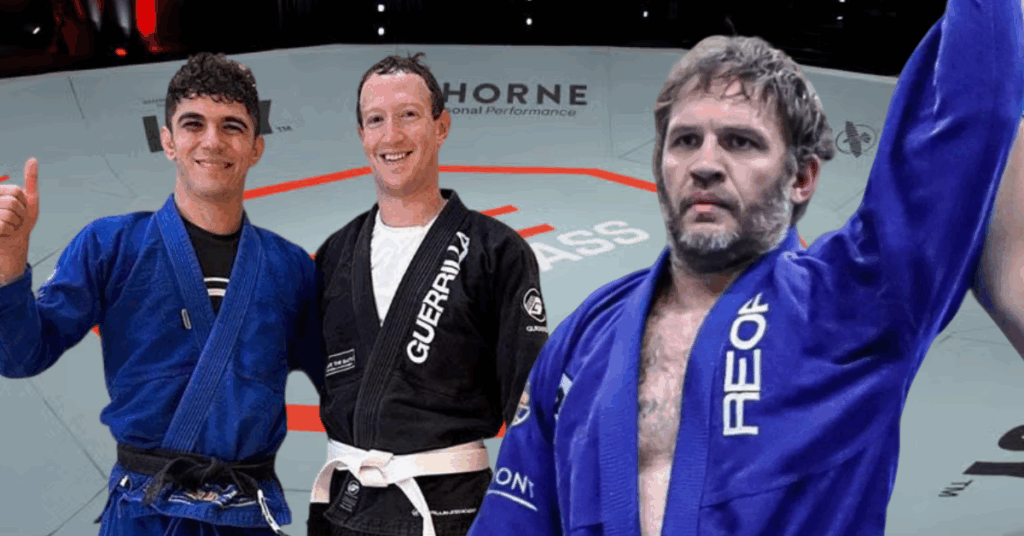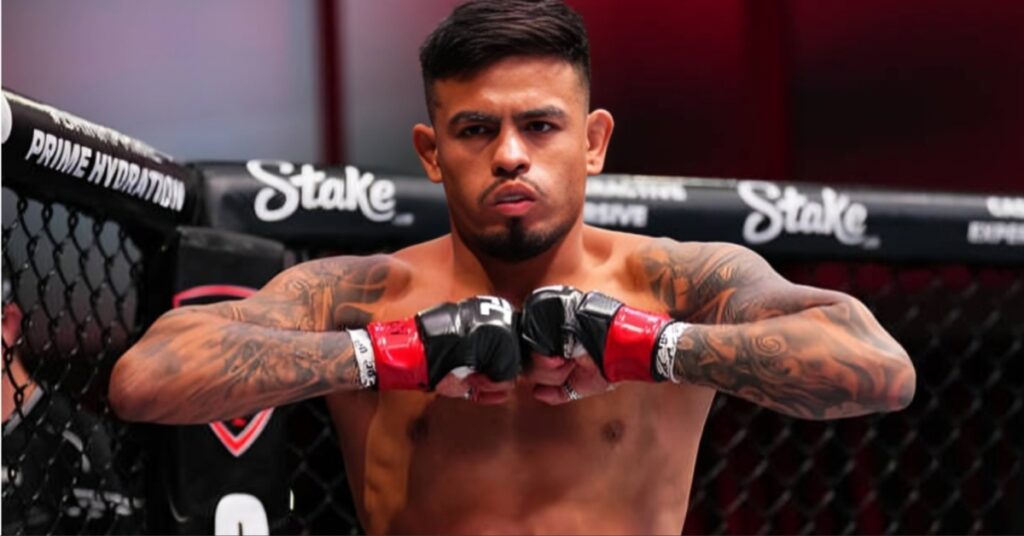Martial Arts Styles of the World
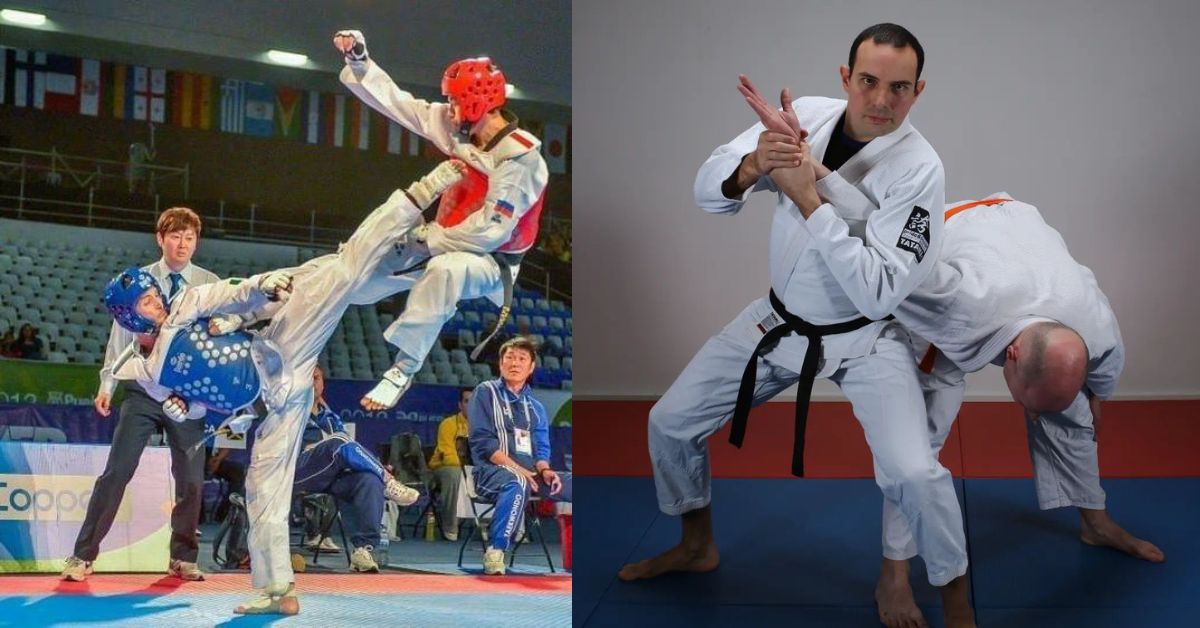
There’s a wide range of martial artist styles practiced around the world. So many that people often wonder how many martial arts styles there are.
That’s why we made this definitive list of all the martial arts styles worldwide. Listing the world’s recognized fighting styles separated into their country/continent of origin.
How Many Martial Arts Styles Are There?
There are over 200 known and acknowledged martial arts styles that are practiced worldwide. Nobody knows the true number of styles since there are thousands of sub-genres of martial arts.
African Martial Arts Styles
Engola (Ngola)
Engola also known as Ngola is an African martial arts style that disguises itself as a form of dancing. It is the Angolan predecessor to Capoeira.
Egyptian Stick-Fighting (Tahtib)
Egyptian stick-fighting also known as Tahtib is an African martial arts style developed during Egypt’s pharaoh period. It was once used in Combat before being transformed into a type of folkloric dance and then more recently reemerging as a martial art.
Dambe
Dambe is a martial arts style and African combat sport that originated in Nigeria and is thought to date back many centuries. It is a Nigerian wrestling style created by the Hausa people.
Istunka
Istunka is a combat sports festival that is held every year in Somalia during the Somali new year. It consists of mock combat and is celebrated alongside another ceremony known as Dabshiid.
Laamb (Senegalese Wrestling)
The Senegalese style of wrestling is known as Laamb which is a martial arts style and type of folk wrestling traditionally performed by the Serer people and is also a national sport in Senegal and parts of The Gambia and many other places in West Africa.
Lutte Traditionnelle
Lutte Traditionnelle is a martial arts style known as West African folk wrestling. It goes by many names such as Laamb, Boreh, Evala and KoKowa.
Moraingy
Moraingy also known as Malagasy is a weaponless, bare-fisted martial arts style that was created during the Maroseranana dynasty between 1675–1896 in the Sakalava Kingdom of western coastal Madagascar. It is the Madagascar style of kickboxing.
Musangwe
Musangwe is a South African martial arts style and is known as South African bare-knuckle boxing and used to be a ritual and passage into manhood for young men but is now a considered a sport.
Nuba Wrestling (Nuba Fighting)
Nuba Wrestling is a Sudanese martial arts style and a form of wrestling practiced by the Nuba people from the Nuba Mountains of South Kordofan state, in South Sudan.
Surma Stick Fighting
Surma Stick Fighting is an Ethiopian martial arts style and stick fighting style that is a ritual and a sport. It is also known as Donga or Sagenai.
Zulu Stick Fighting
Zulu Stick Fighting is an African martial arts style and is the style of stick fighting practiced by the Zulu people. It includes the use of an attacking stick known as an Isikhwili, a defending stick called an Ubhoko, and a defending shield known as an Ihawu.
Australian Martial Arts Styles
Coreeda
Coreeda is an ancient martial art style practiced in Australia and was created by Australia’s Aboriginal people. It is based on Aboriginal combat sports that date back to the pre-colonial period as early as the 19th century.
American Martial Arts Styles
American Karate
American Karate is a variation of Karate that is practiced in the United States. It was first introduced by Japanese and Okinawan karate masters to American servicemen after the end of World War II.
American Kenpo
American Kenpo is an American martial arts style and variation of Kenpo that originated in Hawaii in the early 20th century and was created by James Mitose who learned several martial arts styles in Japan such as Jujutsu and Judo.
Boxing
Boxing is practiced in numerous countries around the world that have their own variation of the martial art. It is also known as Western boxing and Boxers usually wear, hand wraps, gloves, and mouthguard and only involves punching with fists with no kicks or grappling.
Combat Hapkido
Combat Hapkido is a martial arts style that was developed for use in military conflict and created by John Pellegrini in 1990. It is known in Korea as Chon-Tu Kwan Hapkido.
Jailhouse Rock
Jailhouse Rock is a martial arts style developed from the fighting tactics of American prisoners in the 1960s and 1970s.
Jeet Kune Do
Jeet Kune Do is a martial arts style and Kung Fu variation developed by the world-famous martial artist Bruce Lee in 1965.
Kajukenbo
Kajukenbo is a hybrid Hawaiian martial arts style that was developed in the late 1940s in Hawaii. It includes training with kicks, punches, takedowns, and throws and also self defense weapon disarmament.
Kodenkan JuJitsu
Kodenkan JuJitsu is a martial arts style and a grappling variation that borrows tactics from Judo and JJJ. It was created by Seishiro Okazaki a Japanese martial artist in Hawaii.
Kokondo Karate
Kokondo Karate is another form of Karate developed in the US and is a combination of Karate and Jujitsu. Kokondo was created by Paul Arel who also founded the IKA (International Kokondo Association) in 1970.
Lua
Lua also known as Kapu Kuialua is a native Hawaiian martial arts style. It is a dangerous martial art that focuses on bone breaking, pressure point manipulation as well as weapons disarmament including firearms.
MMA
Mixed Martial Arts around the world as MMA is practiced worldwide and includes various styles of martial arts and includes, including punching, kicks, elbows, takedowns, and grappling.
Okichitaw
Okichitaw is the art of tomahawk fighting and was officially created in the United States by Canadian martial artist, George J. Lépine around the beginning of the 1990s but its origins date back centuries. It teaches techniques used by Native Americans but also included Taekwondo and Judo techniques.
Shaolin Kenpo Karate
Shaolin Kenpo Karate is a martial arts style that is a mixture of Shaolin Kung Fu, Kenpo, and other styles of Karate.
Shuri-Ryu
Shuri-Ryu is an American style of Karate that was established in 1946 by Robert Trias in Phoenix, Arizona. Robert Trias was the first Hispanic to teach Karate in the United States.
Small Circle Jujitsu
Small Circle Jujitsu is another hybrid form of grappling based on Judo and Japanese Jiu Jitsu. It was created in the United States by Wally Jay who focused on trying to improve traditional martial art techniques.
To-Shin Do
To-Shin Do is a modernized form of Ninjutsu founded in 1997 by Black Belt Hall of Fame instructor Stephen K. Hayes. The To-Shin Do school is located in Dayton, Ohio, United States.
Bangladeshi Martial Arts Styles
Butthan
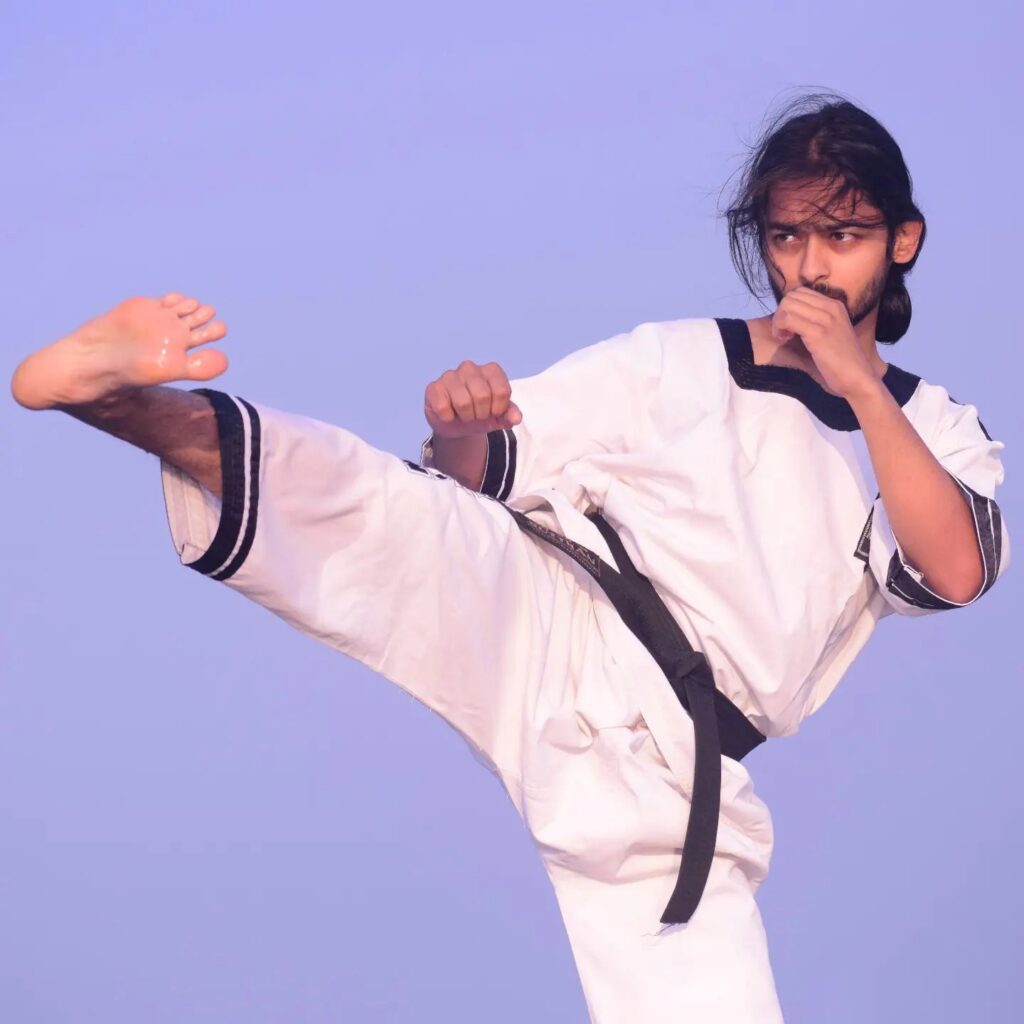
Butthan translated into English as “Defense with distinction and awakening” is a Bangladeshi martial arts style and combat sport. It is Bangladesh’s striking martial arts and self-defense method.
Lathi Khel
Lathi Khel is a traditional Bangladesh martial arts style also known as Bangladeshi stick fighting and is practiced in India as well as in Bangladesh. Lathi Khela originates from the Bengal region in the Indian subcontinent.
Brazilian Martial Arts Styles
Brazilian Jiu Jitsu (BJJ)
Brazilian Jiu-Jitsu is the grappling style created in Brazil that branched off from Judo. It is a combat sport as well as a self-defense martial art based on grappling, submissions and ground fighting.
Capoeira
Capoeira is a famous Brazilian martial arts style that disguises attacks with dancing. It is mostly associated with the northeastern region of Brazil and is normally performed with music or singing.
Luta Livre
Luta Livre is the Brazilian grappling style that was created from catch wrestling. It is also known as Brazilian freestyle fighting or Brazilian submission wrestling. As well as being a martial art style it is also a combat sport.
Vale Tudo
Vale Tudo is the style of Brazilian no holds barred fighting, which also developed into a fighting style. It is a full-contact sport with very few rules.
Myanmar (Burmese)
Bando
Bando is a Burmese martial art style also known as Burmese stick fighting that was created in Myanmar. Bando is often mistaken for all Burmese martial arts but is actually just a single martial arts style.
Lethwei
Lethwei is a Burmese martial art style and possibly the most violent martial art of all. It is a full-contact sport that includes striking with the fists, feet, elbows, and knees and even headbutting is allowed. It is sometimes known as the more violent cousin of Muay Thai.
Cambodian Martial Arts Styles
Bokator
Bokator is a Cambodian martial arts style used by the ancient Khmer military. It is one of the oldest martial arts to come from Cambodia. Bokator includes hand-to-hand combat as well as extensive weapon training using swords and staffs.
Pradal Serey
Pradal Serey is the Cambodian style of kickboxing and translates into English as ‘free fighting’ or ‘free boxing’ also known as Kun Khmer. In Cambodia, the official name of the martial arts style and combat sport is Kbach Kun Pradal Khmer.
Chinese Martial Arts Styles
Bagua Zhang (Baguazhang)
Bagua Zhang is a Chinese style of grappling that focuses on misdirection and open-handed techniques. This martial arts style was created by Dong Haichuan and dates back to the early 19th century in China.
Bajiquan
Bajiquan is a counterattacking style of Kung Fu that is well known for its powerful striking and elbows. Bajiquan translates into English as ‘Eight Extremes Fist’. As well as being popular in Taiwan and China, Bajiquan is practiced around the world including Europe and the United States.
Bak Mei
Bak Mei is a Chinese martial arts style and close-range style of Kung Fu that focuses on powerful short-hand strikes.
Chang Quan
Chang Quan is a Chinese martial art also known as the long fist style of Wushu and originates from Northern China. Its origins date back as early as the 10th century and Emperor Taizu, who was the founding emperor of the Song Dynasty.
Choy Li Fut
Choy Li Fut is a hybrid Wushu martial arts style that combines techniques from various northern and southern Kung Fu styles. It was founded by Chan Heung also known as Din Ying in 1836.
Chuo Jiao (Chuojiao)
Chuo Jiao is a Chinese self-defense style that focuses on jumps, kicks, and fast counterattacks with fists. This style is practiced in the North and Northeast of China.
Crane Style
Crane Style is a Southern Chinese martial arts style and long-range Kung Fu style that mimics a crane. It is believed to have been developed by a female martial artist known as Fang Qiniang.
Ditangquan
Ditangquan is a Chinese martial arts style also known as Chinese ground boxing. Ditangquan originated in the Shandong Province of China during the Song Dynasty.
Dragon Style
Dragon Style is a Chinese Kung Fu style that mimics the attacks and ferocity of animals in particular that of a dragon. It is unique from other styles of kung fu and focuses on using leverage and momentum to generate maximum power.
Drunken Boxing (Zui Quan)
Drunken Boxing is a distinct Kung Fu style, where practitioners move like their drunk to disguise attacks. It is also known as ‘Drunken Fist’, and its origins can be traced back to the Buddhist and Daoist religious communities.
Duan Quan (Short Boxing)
Duan Quan is a Chinese style of close-range boxing also known as ‘short-range boxing’. It was created specifically for use in combat and is most often practised in the Hebei Province of China.
Eagle Claw
Eagle Claw is the Kung Fu style, which mimics the attacks of an eagle. It is a martial arts style known for gripping techniques such as takedowns, pressure point strikes, and Joint locks.
Fu Jow Pai
Fu Jow Pai is a Chinese martial arts style that is an open-hand style of striking. Fu Jow Pai translates into English as ‘Tiger Claw Style’.
Hou Quan (Monkey Fist)
Hou Quan also known as ‘Monkey Fist’ is the monkey style of Kung Fu that utilizes monkey or ape-like movements as part of its techniques.
Hung Gar
Hung Gar is a Southern Chinese martial arts style which is a counterattacking style of Kung Fu that uses both punching and kicking techniques.
Kung Fu
Kung Fu is a blanket term used for various different Chinese martial arts. There are many forms of kung fu, such as Shaolin Kung Fu, Wing Chun, and Tai Chi and they are all practiced all around the world.
Kuntao
Kuntao is a Chinese martial arts style and an open-handed counter-attacking Kung Fu style mainly practiced by the Chinese community of Southeast Asia, in countries such as Malaysia, Indonesia, Singapore, and the Philippines.
Lama Pai
Lama Pai meaning ‘Tibetan Buddhist Master Style’ is a close-range fighting style that uses various arm strikes that used to be known as ‘Lions Roar’. This martial arts style uses animal-style movements such as ape-like grappling.
Lau Gar Kuen
Lau Gar Kuen is a defensive style of Kung Fu that consists of various counterattacks. Lau Gar Kuen originates from a form of boxing that was practiced at Kuei Ling Temple in Kong Sai Province in Western China.
Liu He Ba Fa (Water Style)
Liu He Ba Fa is an internal Chinese martial arts style which is the water style of Wushu, where practitioners flow like water. It is known to be called ‘Water Boxing’ due to its flowing principles.
Long Quan (Longhua Quan)
Long Quan is a martial arts style from China which is a long-range Northern style of Kung Fu. Longhua Quan meaning ‘Wudang Dragon Form’ originates from Northern Wudang and is mainly well known for its detailed leg movements.
Mei Hua Quan
Mei Hua Quan is an ancient style of Chinese boxing that existed as early as the Shang Dynasty between 1600BC and 1046BC. Mei Hua Quan literally translates into English as Plum-blossom Fist.
Mizong Quan
Mizong Quan is a major Northern Kung Fu martial arts style that combines the internal and external schools of Chinese martial arts. Mizong Quan is based on deception and mobility.
Mok Gar
The Mok Gar martial arts style style is believed to have originated with Monk Mo Ta Shi as an inheritance of the Southern Shaolin Fist and is one of the five major family styles of Southern Chinese martial arts.
Nan Quan (Nanquan)
Nanquan originated in Southern China and is also known as Southern Fist, it is a modern combination of several southern styles.
Northern Shaolin Kung Fu
Northern Shaolin Kung Fu originated in northern China. It is considered one of the oldest styles of Shaolin Kung Fu and is said to be the deadliest Shaolin Kung Fu Style of all.
Pak Mei
Pak Mei which is also known as Bak Mei, Pak Mee, and Pai Mai is believed to be one of the Five Elders of the Shaolin who survived a devastating fire in 1647 that completely destroyed the main temple at Henan where monks were slaughtered by the Ching (Qing) Dynasty.
Praying Mantis
Northern Praying Mantis is a martial arts style of Chinese martial art that is sometimes known as Shandong Praying Mantis. It was created by Wang Lang and was named after the Praying Mantis insect which is known for being aggressive.
Sanda (Sanshou)
Sanda is a full-contact martial arts style that was originally developed by the Chinese military based on traditional kung fu and modern combat fighting techniques. It consists of punches, kicks, elbows, and knees as well as trips, throws, and wrestling takedowns.
San Soo
Kung Fu San Soo is one of many Chinese-American martial arts styles. It is based on techniques from all over China, including both Southern and Northern martial art systems.
Shaolin Kung Fu
Shaolin kung fu, also called Shaolin Quan, or Shaolin Wushu, is one of the oldest and most famous styles of wushu, or Kung Fu of Chan Buddhism. In Chinese folklore, it is believed that all martial arts styles originate from Shaolin Kung Fu.
Shuai Jiao
Shuai Jiao (Chinese Wrestling) also known as Jacket Wrestling is the most ancient of all Chinese martial arts styles with a history of over 4,000 years, it is believed to have been first used in a military engagement when the Yellow Emperor of China fought against the rebel Chih Yiu and his army in 2,697BC.
Tai Chi
Tai chi is an internal Chinese martial arts style practiced for self-defense and for health. It is practiced worldwide and is used as a gentle form of exercise and moving meditation.
Tai Chi Quan
Tai Chi Quan is a Chinese exercise system practiced by millions of people worldwide. It was originally developed as a martial art it is now practiced for a wide range of reasons including gentle exercise, meditation, and a method of self-cultivation.
Wing Chun
Wing Chun is a form of Southern Chinese kung fu, and a system of self-defense. The most famous student of Wing Chun is Bruce Lee.
Wushu
Wushu is another blanket term like Kung Fu used for various Chinese martial arts styles. It’s interchangeable with Kung Fu.
Netherlands (Dutch) Martial Arts Styles
Dutch Kickboxing
Dutch kickboxing emerged in the Netherlands in the 1970s and it is a mixture of Muay Thai, Kyokushin, and Western boxing techniques.
English (UK) Martial Arts Styles
Bartitsu
Bartitsu is a martial arts style and self-defense method that started in England in 1898–1902, it combines elements of boxing, jujitsu, cane fighting, and French kickboxing.
Catch Wrestling
Catch wrestling also known as catch-as-catch-can is a hybrid grappling style and combat sport that originated in the United Kingdom.
Defendu
Defendu is a modern martial arts style developed in the United Kingdom by William E. Fairbairn and Eric A. Sykes prior to World War II.
Singlestick (English Stick Fighting)
Singlestick is a martial arts style created in the United Kingdom that teaches the using a wooden stick as a weapon and started as a way of training soldiers to use backswords such as a cutlass or sabre.
Filipino Martial Arts Styles
Dumog (Filipino Wrestling)
Dumog is the Filipino style of wrestling that focuses on grappling whilst standing up.
Escrima
Escrima, also known as Kali, Eskrima, or Arnis, is the national martial arts style of the Philippines that focuses on weapon defense as well as “open-hand” techniques.
Kino Mutai
Kino Mutai also known as Kina Mutai or Kina Motay is a Filipino martial arts style that uses unconventional tactics such as eye-gouging and biting although the prime focus of Kino Mutai is on grappling.
Panantukan (Filipino Boxing)
Panantukan or Suntukan also known as Pangamot, Pakamot and Mano-Mano is the boxing component of Martial Arts in the Philipines.
Sikaran
Sikaran originated in the Philippines and is known to be practiced as early as the 16th century. It is a martial arts sport that mainly involves fighting with the feet rather than with hands.
Yaw-Yan (Filipino Kickboxing)
Yaw-Yan, also called Sayaw ng Kamatayan translates into English as “Dance of Death”. It is a Filipino martial arts style developed by Napoleon A. Fernandez in the 1970s and is based on older Filipino martial arts.
French Martial Arts Styles
Canne de Combat (French Stick Fighting)
Canne de Combat is a traditional French stick fighting martial arts style that consists of striking techniques, feints, blocks, and combinations. In sparring and in competitions, padded clothing, gloves, and head guards are always worn.
Kinomichi (Aikido Variation)
Kinomichi is a martial art style that originated in France in 1979. Developed by Masamichi Noro who was one of the students of Morihei Ueshiba that is the founder of Aikido. While similar to Aikido, Kinomichi is considered a separate martial arts style.
Savate (French Kickboxing)
Savate is a ring-fighting martial arts style that combines French kicking with English boxing. It is a modern sport practiced worldwide by men and women of all ages.
Georgian Martial Arts Styles
Chidaoba (Georgian Wrestling)
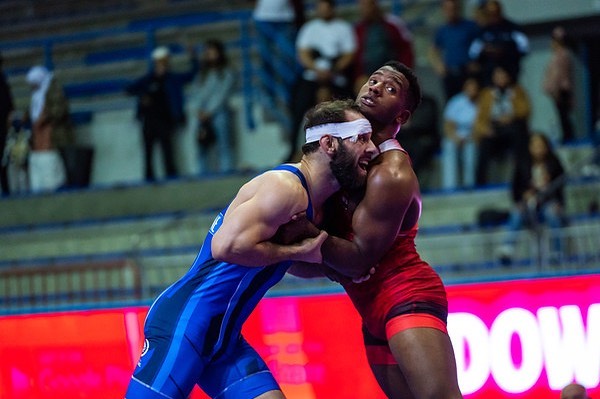
Chidaoba is a blend of jacket wrestling and folk wrestling that dates back to the 9th century. Georgian knights would wrestle one another as a game and develop their grappling skills.
Greek Martial Arts Styles
Pankration
Pankration was an ancient Greek sports event that combined boxing and wrestling, its origins date back to 648BCE and was popular among Spartans.
Wrestling
Wrestling is another martial arts style that has different variations practiced around the world. Some of the early known styles of wrestling were practiced in ancient Greece.
Indian Martial Arts
Gatka
Gatka is an ancient martial art that has existed for thousands of years in Northern India. It is considered to be a spiritual and also a physical exercise.
Malla-Yuddha (Kushti Wrestling)
Malla-Yuddha is an Indian and Southeast Asian martial art that focuses on combat wrestling. Many of the original techniques used in Malla-Yuddha such as punching and biting have been banned in competitions and now the sport focuses on mostly grappling and lifting an opponent off the ground for 3 seconds.
Huyen Langlon
Huyen Langlon is a kind of martial art that hails from Manipur in India. Translated into English from the Meitei language, Huyen means war, and Langlon means art or knowledge.
Kalaripayattu
Kalaripayattu is an ancient martial art that comes from Kerala, a small state in the south of India, and is now practiced around the world by men and women of all ages. Training in Kalaripayattu starts with a full body oil massage to make the body agile.
Lathi
Lathi is a traditional martial art that originated in Bengal, India. Lathi is a kind of stick fighting practiced in India and Bangladesh. People who practice this martial art are known as Lathial.
Mardani Khel
Mardani Khel also known as Bothati is an armed martial art that originated in Maharashtra in India and dates back to the 1600s. It is well known for its use of the Indian Patta (sword) and vita (corded lance).
Niyuddha
Niyuddha is an ancient Indian martial art that focuses on punching, kicking, and throwing although there is a large amount of mediation involved with this particular martial arts style.
Pehlwani (Indian Mud Wrestling)
Pehlwani also known as Kushti is a type of wrestling that originated in India and other areas of South Asia. Pehlwani consists of aspects from two other traditional forms of wrestling, Mall-Yuddha and Koshti Pahlavani. Strikes and kicks are not permitted in Pehlwani and the most moves used are the shoulder throw and strangle pin.
Silambam
Silambam is a martial arts style that originates from Tamil Nadu, South India. Silambam, which is also known as “Silambattam” is considered to be one of the oldest martial arts in the world.
Thang-Ta
Thang-Ta originates from the Meitei people of Manipur in India. Thang-Ta is an armed martial art technique that mostly uses swords, known as thang, and spears, called ta.
Varma Kalai (Varmakalai)
Varma Kalai is a Tamil traditional art of vital points. It combines massage, alternative medicine, yoga, and martial arts in which the body’s pressure points are manipulated to either heal or cause harm.
Indonesian Martial Arts Styles
Cimande
Cimande is believed to have been created by Embah Kahir in the 1700s. Cimande is one of the most well known styles of Pencak Silat and is considered to be one of the styles that was created by the ethnic Sundanese.
Merpati Putih
Merpati Putih translates to English as “White Dove” ‘ which symbolizes Peace and Justice. The origins date back to 1550 inside the Javanese royal kingdom, which was known as Mataram.
Pencak Silat
Pencak Silat is a form of fighting that involves, striking, grappling techniques, and throwing. Fighters are also allowed to use certain types of weapons. In Indonesia, there are hundreds of styles of Pencak Silat.
Poekoelan
Poekeolan is an Indonesian fighting and healing art inspired by the movements of four animals, the monkey, tiger, snake, and crane. It is practiced by people of all ages around the world.
Silat
Silat is a combative art of self-defense and survival that can be traced back to the early days of the Langkasuka Kingdom. Silat is the collective term for a class of indigenous martial arts from the Nusantara in Indonesia and the surrounding geocultural areas of Southeast Asia.
Tarung Derejat
Tarung Derajat is a full-body contact hybrid martial art created by Haji Achmad Dradjat in Bandung, Indonesia in the 1960s. Derajat is a national sport and is used by the Indonesian Armed Forces and Indonesian National Police as a basic martial art training.
Iranian Martial Arts Styles
Kung Fu To’a
Kung Fu To’a is an Iranian style of martial arts that combines Yoga and Kung Fu and was created in the 1950s by Ibrahim Mirzaei. Kung Fu To’a is one of the most practiced martial arts in Iran.
Irish Martial Arts Styles
Bataireacht
Bataireacht dates back to the 16th century and is a mixture of boxing, fencing, and grappling fought with a long wooden stick with a bulbous head that is similar to a walking stick and is known as a Shillelagh.
Israeli Martial Arts Styles
Krav Maga
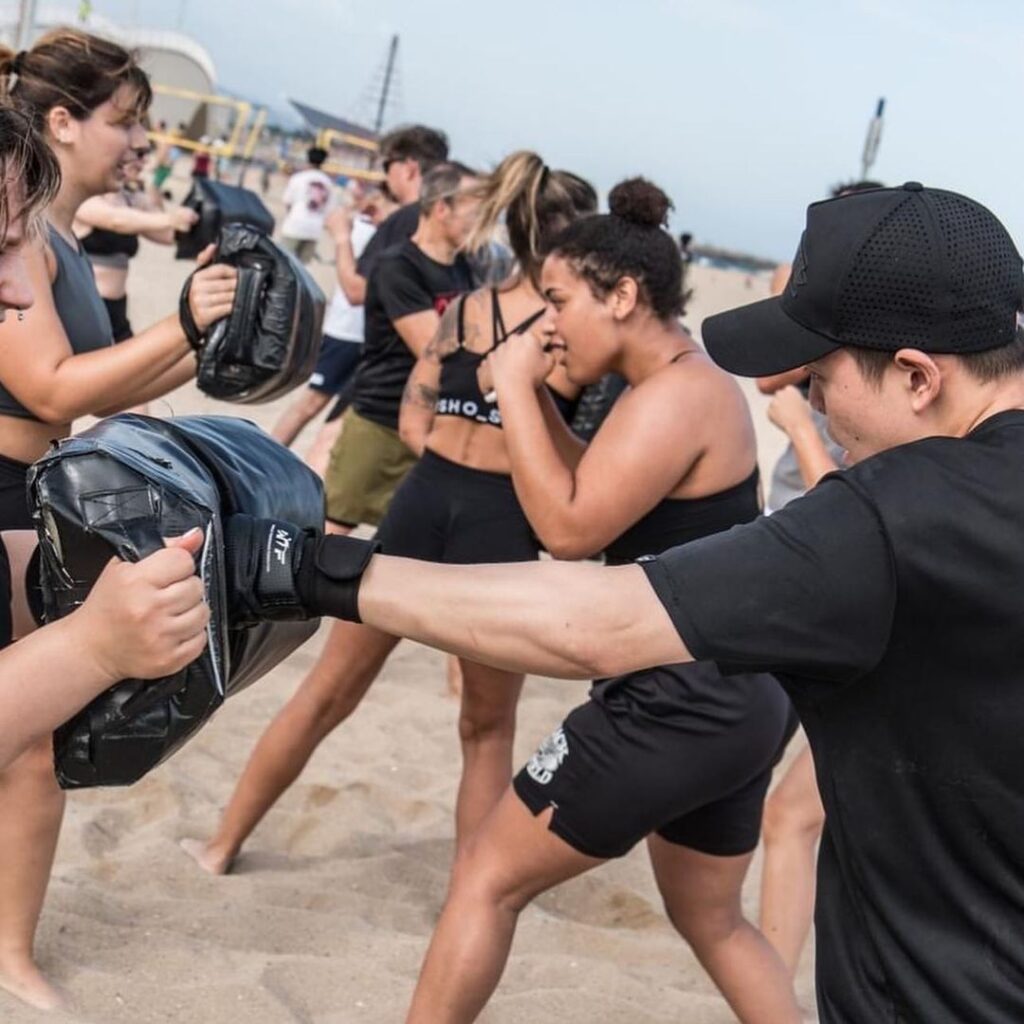
Krav Maga is a martial arts style from Israel that was developed for the Israel Defense Forces. Its root of origin is a combination of techniques used in karate, judo, aikido, boxing, and wrestling.
Japanese Martial Arts Styles
Aikido
Aikido is a Japanese Martial Art that was created in the 1920s by Morihei Ueshiba. Aikido is a self-defense system that resembles the fighting methods of Jujitsu and Judo.
Araki Ryu Kempo
It is believed that Araki-Ryu Kempo was founded by Araki Muninsai in the last years of the Warring States era in Japan. Araki-Ryu Kempo is a comprehensive system that focuses on the use and application of many traditional Japanese weapons such as the short sword, chain, and sickle.
Bajutsu
Bajutsu is a Japanese martial art that originated in the 7th century AD. It teaches how to fight with weapons on horseback and also includes the training of horses to accustom them to the noise and action of battle.
Bojutsu
Bojutsu is a Japanese martial art of stick fighting that mainly focuses on training with a bo staff. The bo staff is seen as one of the best weapons to counter a samurai’s sword.
Byakuren Kaikan
Byakuren Kaikan translates into English as “White Lotus Association” and is also known as Byakuren Karate which is a full-contact karate style founded by Sugihara Masayasu in 1984.
Daido Juku Kudo
Daido Juku Kudo, also known simply as Kudo is a mixed Budo sport that comprises full contact punches, kicks, throwings, and submission techniques on the ground. It originates from Kakuto Karate which is translated into English as Combat Karate.
Daito-Ryu Aikijutsu
Daito-Ryu Aikijutsu is a Japanese martial art that under the headmastership of Takeda Sōkaku became widely known in the early 20th Century. Takeda’s best-known student was Morihei Ueshiba, the founder of Aikido.
Enshin Kaikan
Enshin kaikan is a martial arts style founded in 1988 and is also known as full-contact karate or knockdown karate. Enshin kaikan is now practiced in dojos all around the world.
Goji-Ryu Karate
Goji-Ryu, translated to English means “hard-soft style”, Goji-Ryu Karate is one of the main traditional Okinawan styles of karate, that features a combination of both hard and soft techniques.
Hanbojutsu
Hanbojutsu is a Japanese martial art that utilizes a 3-foot wooden staff known as a Hanbo. The Hanbo is used to subdue opponents with swords by pokes, thrusts, and blocks.
Hojojutsu
Hojōjutsu means “Restraining Rope Technique” in English and is the traditional Japanese martial art of restraining a person using a cord or rope, and was used as a precursor to handcuffs now used in the modern-day.
Iaido
Iaido is a martial arts style that focuses on drawing and cutting with a sword in the same motion. Iaido evolved from Iaijutsu and involves drawing the blade from the scabbard, cutting the opponent, then cleaning the blood off the blade, and returning it to the scabbard, doing so all in one motion.
Iaijutsu
Iaijutsu is the combat version of Iaido. It is a Japanese martial arts style focused on the quick draw and simultaneous cut with a sword known as a Katana or Wakazashi. This martial art is also known as Battojutsu.
Isshin-Ryu
Isshin-Ryu is a style of Okinawan karate founded in 1956 by Tatsuo Shimabuku. Isshin-Ryu translates into English as “one heart method” There are branches of Isshin-Ryu around the world but most of them are in the United States.
Itto-Ryu
Itto-Ryu is a Japanese martial arts style that focuses on the sword. This martial art had a significant influence on the development of modern Kendo and has many sub-styles.
Japanese Jiu-Jitsu (Jujitsu)
Japanese Ju-Jitsu is a martial arts style from which Judo and BJJ derived. It involves physical fighting and self-defense as well as defense from small weapons. Japanese Ju-Jitsu students also study technique theory, the human body, and first aid.
Japanese Kickboxing
Japanese Kickboxing is a martial arts style and combat sport that was created by the Japanese boxing promoter Osamu Noguchi and the Karate practitioner Tatsuo Yamada. It is similar to Muay Thai and involves kicks and punches and fights normally take place in a boxing ring.
Judo
Judo translates to English from Japanese as “gentle way” and is an unarmed modern Japanese martial arts style, It has also been an Olympic sport since 1964 and is the most prominent form of jacket wrestling that is competed worldwide.
Jukendo
Jukendo is a Japanese martial arts style that is very similar in practice and equipment to Kendo. Jukendo uses a wooden rifle with an attached bayonet in order to practice bayonet techniques, whereas Kendo uses a sword.
Juttejutsu
Juttejutsu is a Japanese martial arts style using the Japanese weapon Jitte which is also known as Jutte, It was used by law enforcement to disarm and apprehend armed criminals.
Karate
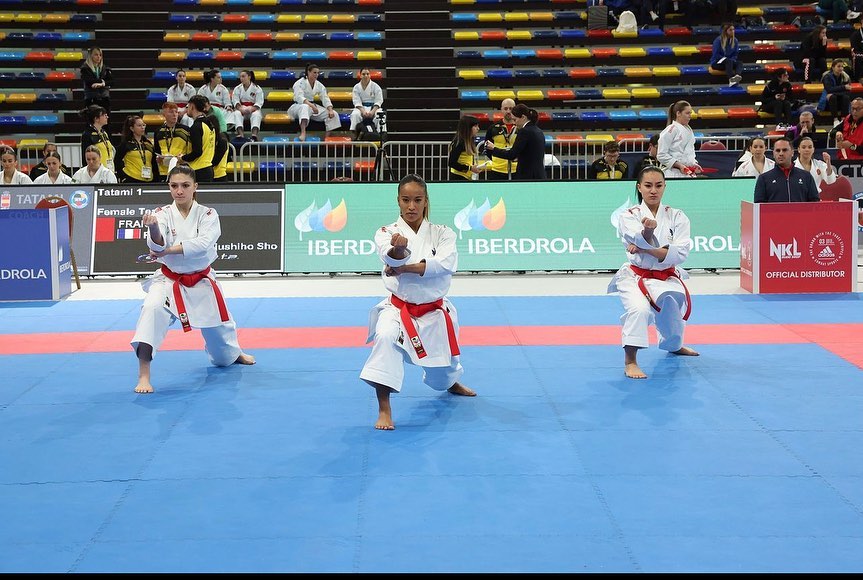
Karate is a Japanese martial arts style developed in the Ryukyu Kingdom and came to Japan in the early 20th Century. Karate focuses on striking using punches, kicks, knee strikes, elbow strikes, as well as open-hand techniques such as knife-hands, spear-hands, and palm-heel strikes.
Kendo
Kendo is a modern Japanese martial art that descended martial arts style from Kenjutsu that uses bamboo swords known as Shinai as well as protective armor called Bōgu. It is practiced all over Japan and many other countries around the world.
Kenjutsu
Kenjutsu is a Japanese martial arts style the focuses on swordsmanship, it originates from the Samurai class of Japan. It translates into English as “the method of” or “the technique of” the sword.
Kobudo
Kobudo is a Japanese martial arts style that focuses on traditional techniques for the use of armor, knives, and firearms, and its techniques are related to combat and horse riding.
Kyokushin Karate
Kyokushin Karate is a Japanese martial art known for being one of the harder substyles of Karate. During sparring events, there is no use of gloves or headgear although they do use mouthguards and groin protection.
Kyudo
Kyudo is the Japanese martial art of Archery, before 1919 it was known as Kyūjutsu and originated with the samurai class of feudal Japan. The bow used is called a Yumi which can be as big as 2 metres in length. Kyudo is practiced by many people in different countries around the world.
Kyujutsu
Since 1919 Kyūjutsu is now known as Kyudo and is the Japanese martial art of Archery.
Kyusho Jitsu
Kyusho Jitsu is a martial art from Japan that focuses on targeting pressure points. Targeting pressure points is an effective way of attacking the nervous system which can help control or subdue any attackers.
Naginatajutsu
Naginatajutsu is a martial art from Japan that focuses on a long-pole weapon that is known as the Naginata, which looks like a spear that has a long curved blade at the top. The Naginata gives opponents a reach advantage over opponents with traditional swords.
Ninjutsu
Ninjutsu is traditionally known as Ninpō and is a Japanese martial arts style and is commonly associated with the Japanese Shinobi or Ninjas. It focuses on stealth and deception as a way of self defense or to fulfill an objective.
Nippon Kempo
Nippon Kempo is a Martial art from Japan that is practiced using protective gear such as gloves, headgear, body, and crotch protectors. It involves striking and throws and also includes fighting on the ground.
Niten Itchi-Ryu
Niten Ichi-Ryu which translates into English as “2 heavens as one school” is a two-sword Japanese martial art style that was created by the Japanese samurai, known as Miyamoto Musashi.
Nunchaku Jutsu
Nunchakujutsu is a Japanese martial art that focuses on the use of Nunchucks also known as ‘Nunchaku‘ as a self-defense and training tool. It originates from Okinawa in Japan.
Shintaido
Shintaido is a hybrid Japanese martial art that combines other martial arts such as Karate, Kenjutsu, and Botjutsu with spiritual and meditation elements. Shintaido focuses on more relaxed techniques and is not a hard form of self-defense.
Shito-Ryu-Karate
Shito-Ryu-Karate was founded by Kenwa Mabuni who died in 1958 and after his death Shito-Ryu broke into different associations and school systems. Due to this fact, different organizations use different katas and also have the kata in different orders.
Shootfighting
Shootfighting was created in the 1970s and by the 1980s the Universal Wrestling Federation (UWF) was created in Japan and then in the early 1990s organizations like the Pancrase Shoot Organisation and Shooto were created. Shootfighting is a mix of other martial arts such as Judo, Muay Thai, Kickboxing, and Karate.
Shooto
Shooto was created in 1985 by Satoru Sayama and is a Japanese martial art similar to MMA. This martial art is also known as a form of Japanese shoot wrestling.
Shorinji Kempo
Shorinji Kempo was founded in 1947 by So Doshin. He created the Japan Shorinji Kempo Federation, and in 1974 he set up the World Shorinji Kempo Organization. Shorinji Kempo is based on the teachings So Doshin learned during his time in China.
Shorin-Ryu Karate
Karate started in Okinawa, Japan, and Shorin Ryu karate is the oldest and most traditional form of martial art to come from Okinawa.
Shotokan Karate
Shotokan Karate was developed in Okinawa, Japan by Gichin Funakoshi. Shotokan Karate is one of the most popular martial arts styles that are taught around the world. This particular branch of Karate focuses on kata, punches, hand strikes, elbow strikes, knee strikes, and kicks.
Sojutsu
Sojutsu translates as “art of the spear” and is a martial art from Japan that focuses on fighting with a Japanese spear.
Spochan
Spochan was created by Tetsundo Tanabe in Japan but has spread to numerous different countries around the globe. Spochan is also known as the sport Chanbara. It is a martial art that focuses on air soft sword, stick, and staff based techniques.
Sumo
Sumo is a Japanese form of wrestling in which a wrestler loses if he is forced from the ring, or if any part of his body touches the ground apart from the soles of his feet.
Taido
Taido is a Japanese martial art created by Seiken Shukumine in 1965. Taido roots are found in traditional Okinawan karate.
Taiho Jutsu
Taiho Jutsu is a Japanese martial arts style that was originally created to help police arrest armed criminals. In modern times, it mainly focuses on non-lethal approaches such as restraints, although there is a large amount of training in traditional martial arts techniques such as punches and kicks.
Tessenjutsu
Tessenjutsu is a martial art from Japan that utilizes the war fan (also known as a tessen) as a weapon. Tessenjutsu was originally practiced by samurai warriors as a form of self-defense in times when carrying a sword was forbidden.
Wado-Ryu Karate
Wado-Ryu also known as Wadoryu is one of the major karate styles alongside Shotokan, Shito Ryu, Goju Ryu, Kyokushin, and Kenpo. Wado-Ryu is a combination of Jiu-Jitsu and Karate and was once called Shinshu Wadoryu Karate-Jujutsu.
Yabusame
Yabusame is a martial art where archers ride on horseback along a track roughly 250 meters long and have to shoot targets whilst at full speed and then come to a grounding halt. The score is based solely upon how many targets are hit.
Yamanni-Ryu
Yamanni-Ryu is a weapon-based martial art that originated in Japan that focuses on training with Okinawan weapons known as Kobudo. Students primarily train with the Bo (staff) although Sai and Tonfa are also used.
Yoseikan Budo
Yoseikan Budo is a martial art style originating in Japan that combines several different martial arts including Jujutsu, Jujutsu, Boxing, Aikido, Kobudo, Karate, and Judo.
Korean Martial Arts Styles
Gongkwon Yusul
Gongkwon Yusul is a hybrid martial art founded in Korea by Kang Jun in 1996. Gongkwon Yusul combines elements from Jujutsu, Hapkido, Boxing, and Judo.
Gungdo (Gungsol)
Gungdo (or Gungsul or Gungsol) is a weapon-based martial art from Korea that focuses on traditional archery. It has similarities to Kyudo which is a Japanese martial art. This Korean martial art is practiced on horseback or standing.
Haidong Gumdo
Haidong Gumdo is a Korean martial art that teaches sword techniques. It is similar to Iaido and Kenjutsu.
Han Mu Do (Hanmudo)
Han Mu Do is a Korean martial art style that focuses on a balanced fighting system that is adapted from modern and traditional Korean fighting arts.
Hapkido
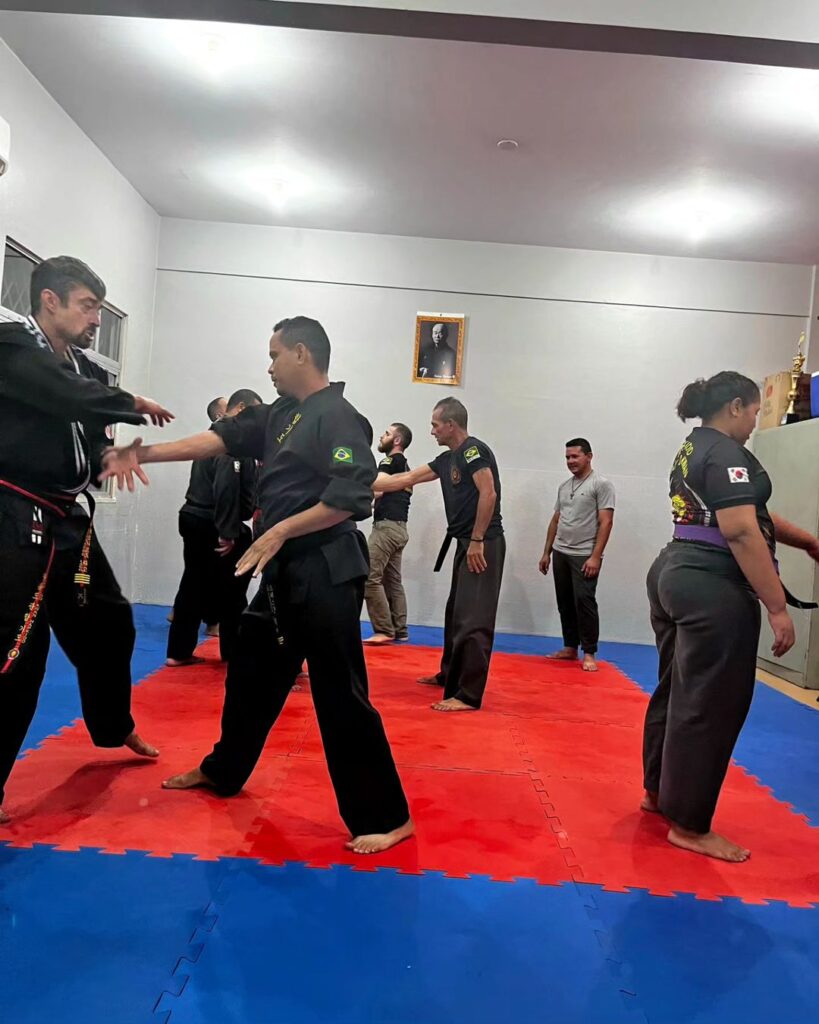
Hapkido is a martial art style from Korea that focuses on kicks, punches, throws, and joint locks. Hapkido also includes some weapons training with bo staffs, swords, and canes.
Hwa Rang Do
Hwa Rang Do is a Korean martial art and was developed in the 1960s by Joo Bang Lee and his brother Joo Sang Lee. It is also called “The Way of the Flowering Knights” and Hwa Rang Do has several areas of focus including stand-up fighting with open-hand striking, ground fighting, throws and takedown, and weapons.
Kuk Sool Won
Kuk Sool Won literally translates as ‘Korean martial arts. It was founded by Suh In-Hyuk in 1958 and is a systematic study of all of the Korean traditional fighting arts.
Kumdo
Kumdo is a Korean martial arts style that is derived from the Japanese Kendo and is the Korean art of the sword. Kumdo literally means ‘the way of the sword’.
Kyuk Too Ki (Korean Kickboxing)
Kyuk Too Ki is a martial arts style from Korea that is a combination of Taekwondo and Muay Thai. It is a full-contact sport that includes kicks, punches, elbow strikes, and knee strikes.
Sibpalki
Sibpalki is a martial arts style from Korea that teaches close combat skills that includes empty hand techniques as well as training with martial arts weapons such as swords and shields, spears, and staffs.
Soo Bahk Do
Soo Bahk Do is a Korean martial arts style. This martial art was originally the ancient martial art of Korea and focuses on punches, kicks, and self-defense.
Ssireum
Ssireum known as Korean wrestling is a folk wrestling style that began in the 4th century and is the traditional national sport of Korea.
Taekkyon
Taekkyeon is a traditional martial arts style from Korea, It focuses on rhythmic fight moves that are like a fluid dancing style.
Taekwondo
Taekwondo is a Korean martial art that focuses on kicks and punches. Taekwondo began in 1945 after the end of the second world war when new martial arts schools called ‘Kwans’ created by Chinese and Japanese martial artists opened in Seoul.
Tang Soo Do
Tang Soo Do is a Korean martial arts style similar to that of Karate and Taekwondo. The actor Chuck Norris is probably the most famous student of Tang Soo Do.
Tukong Moosul
Tukong Moosul also known as Teukgong Moosool is a martial art style from Korea. It combines techniques from Hapkido, Taekwondo, and Judo and was developed by South Korean special forces units. It is not considered a sport and focuses on self-defense which includes training with weapons.
Won Hwa Do
Won Hwa Do is a martial arts style from Korea and was founded in 1972 by Great Grand Master Han Bong Ki. Some people who practice Won Hwa Do believe it is a combination of Japanese Aikido and Korean Hapkido.
Yongmudo
Yongmudo or Yongmoodo is a martial arts style from Korea. Yongmudo translates into English as “Dragon Martial Way” and includes techniques from Taekwondo, Ssireum, and Judo. Yongmudo focuses on kicks, throws, punches, and joint locks.
Mongolian Martial Arts Styles
Bokh
Bokh is an ancient Mongolian form of wrestling that is believed to date back to 7000BC. During a contest touching the floor with any other part of the body other than the foot means you lose the match.
New Zealand Martial Arts Styles
Mau Rakau
Mau Rakau was developed by the Maori of New Zealand and is a weapons-based martial art that teaches the use of traditional Maori weapons such as the Mere, Taiaha and Tewhatewha.
Russian Martial Arts Styles
Bonvoy Sambo (Combat Sambo)
Bonvoy Sambo is a martial arts style also known as Combat Sambo was developed for the military in Russia. Bonvoy Sambo is similar to MMA. it involves extensive forms of striking and grappling. Bonvoy Sambo allows punches, kicks, elbows, knees, headbutts, and groin strikes.
Kadochnikov
Systema is a Russian martial arts style created by Aleksey Alekseyevich Kadochnikov. It is based on the application of the physical sciences, such as laws of mechanics, physics, and psychology, and also teaches hand-to-hand combat and survival skills.
Khapsagay
Khapsagay is Mongolian wrestling also known as Bokh and is the folk wrestling style of Mongolia.
Kulachniy Boy (Russian Boxing)
Kulachniy Boy is Russian Bare Knuckle Boxing and literally translates as ‘Fist fighting’. Its origins date back to the 13th Century.
Sambo
Sambo is a Russian martial arts style and combat sport that was developed in the early 1920s and was used by the Soviet Red Army. It is similar to Jujutsu and Judo but includes various wrestling techniques and self-defense systems.
Slaviano-Goretskaya Borba (Sambo Variation)
Slaviano-Goretskaya Borba literally translates as ‘Slavic-hill wrestling’ and was developed by A.Belov from Moscow.
Spetsnaz
Spetsnaz is a Russian martial arts style used by the Russian military and dates back to the 10th century. It was developed by Russian Warriors known as Cossacks. Spetsnaz teaches how to use only a small amount of physical strength and how to use more of a natural flow of inner energy.
Systema
Systema is a Russian Martial art used by the military and was also used by the KGB. It concentrates on self defense and how to protect yourself from weapons such as knives and guns as well as grappling. It also teaches personal wellness.
Samoan Martial Arts Styles
Limalima
Limalama is a Samoan martial arts style that focuses on the art of self-defense It was created and founded by Tu’umamao “Tino” Tuiolosega who created the word Limalina and defined it to mean ‘knowledge and understanding’ although it translates into English as ‘hand of wisdom’.
Scandanavian Martial Arts
Defendo Alliance
The Defendo Alliance is a martial art that focuses on self-defense training. Defendo Alliance schools are mostly located in Scandinavian countries but can be found around the world including in the United States. It is similar to the martial art Krav Maga.
Glima Wrestling
Glima wrestling is an Icelandic martial arts style that has been around for centuries. It is still very popular in Iceland but is also popular in Canada, the United States, and Australia.
Spanish Martial Arts
Fencing
Fencing is a combat sport that focuses on sword fighting. Its origins date back to the end of the 19th century. To score points in Fencing you must touch your opponent with your sword.
Keysi Fighting Method
The Keysi Fighting Method is a self-defense system that was created in Spain in 1980 by Justo Dieguez. This martial art has been used in many Hollywood movies.
Sri Lankan Martial Arts Styles
Angampora
Angampora is a martial arts style from Sri Lanka that teaches combat techniques, sports, self-defense, exercise, as well as meditation. It has been around for thousands of years. It does not include any training with weapons.
Swiss Martial Arts Styles
Schwingen
Schwingen is also known as Swiss wrestling and is a style of wrestling native to Switzerland. It teaches throws and trips and when you can make your opponent’s shoulders make contact with the ground you win the bout.
Thai Martial Arts Styles
Krabi-Krabong
Krabi-Krabong is a weapons-based martial art that originated in Thailand but unarmed combat is also taught. The weapons used are mainly staffs and swords with ‘Krabi meaning sword’ and ‘Krabong meaning staff’.
Lerdrit
Lerdrit is a martial arts style used by the Thai Royal Army and is a militarized version of Muay Thai. It is designed to be used in combat so any safety rules used in Muay Thai are not used in Lerdrit.
Muay Boran
Muay Boran translates into English as ‘ancient boxing” and is a term used to describe unarmed martial arts that existed before the introduction of modern equipment and rules in the 1930s.
Muay Thai
Muay Thai also known as Thai Boxing is a martial art style from Thailand and that can be traced back to the 16th century. It teaches kicks, punches, shins, and elbows. It is now practiced worldwide and a practitioner of Muay Thai is known as a Nak Muay.
Ukrainian Martial Arts
Combat Hopak
Combat Hopak also known as Boyovyy Hopak is a Cossack martial arts style from Ukraine. Combat Hopak schools can be found in Ukraine as well as in countries such as Canada and the United States that have a large Ukrainian immigrant population.
Vietnamese Martial Arts Styles
Cuong Nhu
Cuong Nhu is a Vietnamese martial arts style that was developed by Ngo Dong in 1965 in Hue, Vietnam. Cuong means ‘hard’ and Nhu means ‘soft’ and Cuong Nhu is a combination of other martial arts such as Judo, Wing Tsun, Shotokan, Vovinam, Boxing, Tai chi chuan, and Aikido.
Nam Hong Son
Nam Hong Son is a Vietnamese martial arts style that was created by Master Nguyen Nguyen To in 1920. Nam Hong Son is a combination of Shaolin and Vietnamese martial arts.
Nhat Nam
Nhat Nam is a Vietnamese martial arts style that was formalized by Ngô Xuân Bính in 1983. Nhat Nam became established in Russia in the 1990s and is also practiced in Switzerland, Ukraine, Belarus, Lithuania, and the UK.
Qwan Ki Do
Qwan Ki Do is a martial art style from Vietnam and was codified in France in 1981. It is practiced around the world with schools in Asia and in Europe. It includes striking, kicks, stances, throws, and holds but also includes some weapon self-defense training.
Vovinam
Vovinam is a Vietnamese martial arts style, that is considered one of their national prides like Karate is to the Japanese and Taekwondo is to the Koreans. It includes throws from Judo, kicks from Taekwondo, and grapples from Hop Kido. It is officially known as Viet Vo Dao meaning “Vietnamese Way of Martial Arts”.



